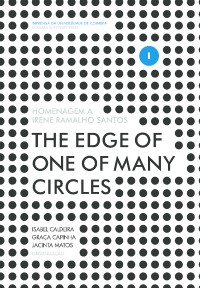Please use this identifier to cite or link to this item:
https://hdl.handle.net/10316.2/42322| Title: | An interrupting poem: Elizabeth Bishop’s "Crusoe in England" | Authors: | Matterson, Stephen | Keywords: | Elizabeth Bishop;“Crusoe in England”;poetics;allusion;intertextuality;Elizabeth Bishop;“Crusoe in England”;poética;alusão;intertextualidade | Issue Date: | 2017 | Publisher: | Imprensa da Universidade de Coimbra | Journal: | http://hdl.handle.net/10316.2/42307 | Abstract: | Elizabeth Bishop’s intertextual practice is often overlooked, with her borrowings and allusions receiving less attention than those her mentor Marianne Moore and her friend Robert Lowell. But as more of Bishop’s work and her letters become available, we can start to assess her intertextuality a little more certainty than before. Her borrowings and usages are often playful (“Sunday at Key West” as a lighthearted glance at Wallace Stevens), and are typically embedded deeply in the poem, as in “The Fish.” When they are explicit they often involve an investment in objectivity, an imagined entry into another consciousness, as in “From Trollope’s Journal,” a tactic allowing political statement into the poem, voiced by another. This paper considers Bishop’s allusions with a focus on one of her longer, late works, “Crusoe in England.” This poem is, naturally, intertextual from the start, borrowing from Defoe. It also includes (anachronistically) a key quotation from Wordsworth, and Bishop examines literary heritage, and her own positioning in poetic tradition. I explore her borrowings and the implications of them for a reassessment of her poetry, and consider the use of persona that the poem involves, and the strategy of deflected autobiography. A intertextualidade na poesia de Elizabeth Bishop é frequentemente descurada, e as citações e alusões na sua obra têm recebido uma atenção menor do que a dispensada a poetas como Marianne Moore e Robert Lowell. Mas, à medida que as suas cartas e outras obras têm saído à estampa, começa a ser possível avaliar com mais exatidão a sua prática intertextual. De natureza muitas vezes lúdica (“Sunday at Key West”, um aceno despreocupado a Wallace Stevens), as práticas alusivas operam em geral na textura profunda do poema, como em “The Fish”. Quando explícitas, implicam com frequência um investimento na objetividade, entrando‑se imaginativamente na consciência de um outro, como é o caso de “From Trollope’s Journal”, de forma a tomar uma posição política através do uso da voz desse outro. Este artigo analisa o uso da alusão em Bishop com especial ênfase num dos seus poemas tardios mais longos, “Crusoe in England”, em que a intertextualidade está presente desde o início na alusão a Defoe. A autora utiliza anacronisticamente uma citação de Wordsworth e reflete sobre a herança literária e o seu próprio posicionamento no âmbito da tradição poética. A análise das intertextualidades neste poema permite‑nos repensar a sua poesia, tendo em conta o uso da persona e a estratégia de uma autobiografia por assim dizer deslocada. |
URI: | https://hdl.handle.net/10316.2/42322 | ISBN: | 978-989-26-1308-6 (PDF) 978-989-26-1307-9 |
DOI: | 10.14195/978-989-26-1308-6_12 | Rights: | open access |
| Appears in Collections: | The Edge of one of many circles: homenagem a Irene Ramalho Santos |
Files in This Item:
| File | Description | Size | Format | |
|---|---|---|---|---|
| an_interrupting_poem.pdf | 204.62 kB | Adobe PDF |  |
Items in DSpace are protected by copyright, with all rights reserved, unless otherwise indicated.
